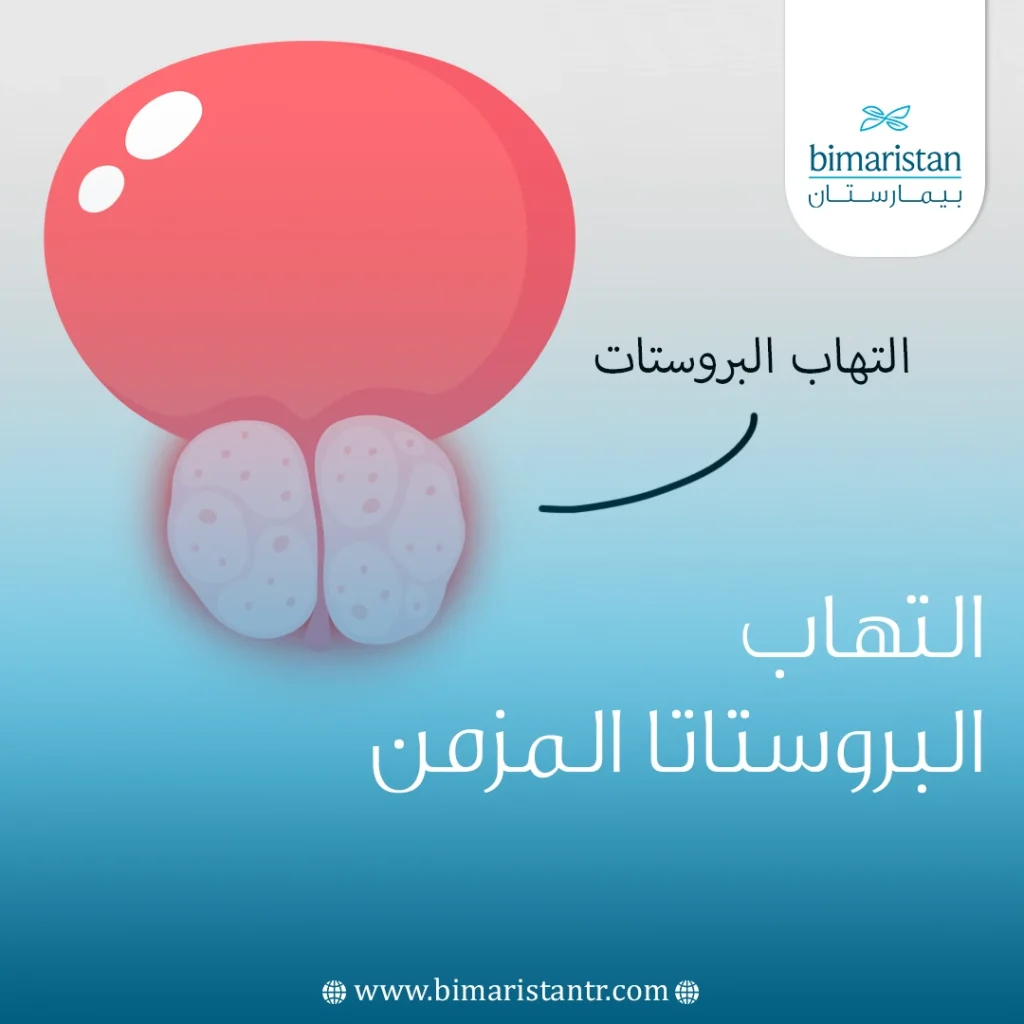علاج التهاب البروستاتا المزمن هو أمر خطير ومهم لدى الرجال، لأن التهاب البروستات المزمن قد يؤدي لسرطان البروستاتا ولعجز جنسي، وتركيا خير مكان لعلاج هذه الحالة.
علاج التهاب البروستاتا المزمن لم يعد من الأمور المستحيلة حيث أصبح في الإمكان علاجه في تركيا عبر أحدث الطرق المتوفرة عالمياً، ولأن أعراض التهاب البروستاتا المزمن مخاتلة وتشترك مع العديد من الأمراض التي تسبب ألم حوضي، فإن تشخيص هذه الحة يحتاج لأفضل الأيادي الخبيرة في تركيا.
علاج التهاب البروستات المزمن قد يكون مانعا للعديد من المشاكل المترافقة مع هذه الحالة، وللمريض عدة أسئلة يطرحها للطبيب فما هو أقوى مضاد حيوي لعلاج التهاب البروستاتا المزمن؟ وهل يمكن علاج التهاب البروستاتا المزمن نهائياً؟ تابع معنا في هذا المقال.
ما هو التهاب البروستاتا وكيف يتم علاج البروستاتا المزمن والحاد في تركيا؟
التهاب البروستاتا هو حالة شائعة، وغالبا ما تكون مؤلمة من الممكن أن تصيب الرجال من جميع الأعمار.
ألم الحوض في البروستاتا وحولها قد يكون من:
- العدوى البكتيرية الناجمة عن البكتيريا.
- التهاب المنطقة (الاحمرار، التورم) من إصابة أو عدوى.
- بعض المشاكل الأخرى.
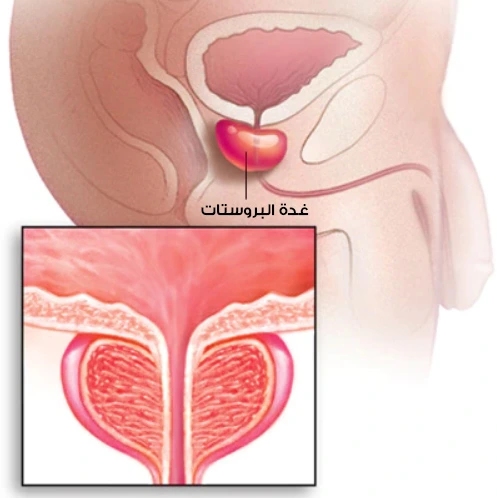
البروستاتا هي غدة صغيرة على شكل الجوز وهي جزء من الجهاز التناسلي الذكري. تتموضع تحت المثانة وأمام المستقيم، والبروستاتا محاطة بالعضلات والأعصاب.
يمر الاحليل (الأنبوب الذي يحمل البول والنطاف إلى خارج الجسم) عبر غدة البروستاتا.
المهمة الرئيسية للبروستاتا هي المساعدة في صنع السوائل اللازمة للسائل المنوي، حيث يحمي هذا السائل النطاف ويغديها إلى أن تستقر في البويضة.
أعراض التهاب البروستاتا للشباب وكبار السن
تختلف هذه الأعراض باختلاف نوع الالتهاب، فأعراض التهاب البروستاتا المزمن تتفاوت بشكل كبير عن الالتهاب الحاد وفيما كان الالتهاب مترافقا بحالات أخرى.
هناك 4 أنواع من التهاب البروستاتا:
1.التهاب البروستاتا المزمن/متلازمة ألم الحوض المزمن (CP/CPPS)
CP/CPPS هو النوع الأكثر شيوعا من التهاب البروستاتا، لكنه ليس عدوى أو إنتان.
يأتي المريض عادة بمشاكل في التبول وألم وحرقة، كما يمكن أن يكون هنالك ألم في المثانة والخصية والقضيب وحتى عند القذف وحتى مشاكل في الانتصاب.
2.التهاب البروستاتا البكتيري المزمن
التهاب البروستات البكتيري المزمن هو نوع غير شائع، ويتطلب زرع لبكتيريا البول والبروستاتا للتحقق من وجود هذا النوع من الالتهاب.
أهم علامة له أنه يأتي ويذهب بشكل متكرر على فترة طويلة من الزمن.
يأتي المريض غالبا بشعور حرق أثناء التبول كما يحدث لديه سلس إلحاحي بالإضافة لمفرزات كريهة من القضيب مع كون البول كريه الرائحة بسبب وجود إنتان.
ألم القذف شائع وقد يكون الإنتان قد انتشر إلى باقي الأعضاء لذلك يجب العلاج بسرعة.
3.التهاب البروستاتا الحاد (المفاجئ)
التهاب البروستاتية البكتيرية الحادة هو أيضا نوع غير شائع من التهاب البروستاتا البكتيرية، حيث يتطلب اختبار البول لمعرفة ما إذا كان هناك أي بكتيريا.
كما تظهر الأعراض بشكل مفاجئ ويمكن أن تكون مؤلمة في بعض الأحيان.
ومن أعراض التهاب البروستاتا البسيط الحاد:
- قشعريرة
- حمة
- حرق مؤلم جدا أثناء اجتياز البول
- مشكلة استنزاف المثانة الخاصة بك
4.التهاب البروستاتا غير البكتيري
التهاب البروستاتا غير البكتيرية هو التهاب مع عدم ظهور أعراض، فهي ليست عدوى، حيث لن يكون لديك أية أعراض لهذا النوع من التهاب البروستاتا.
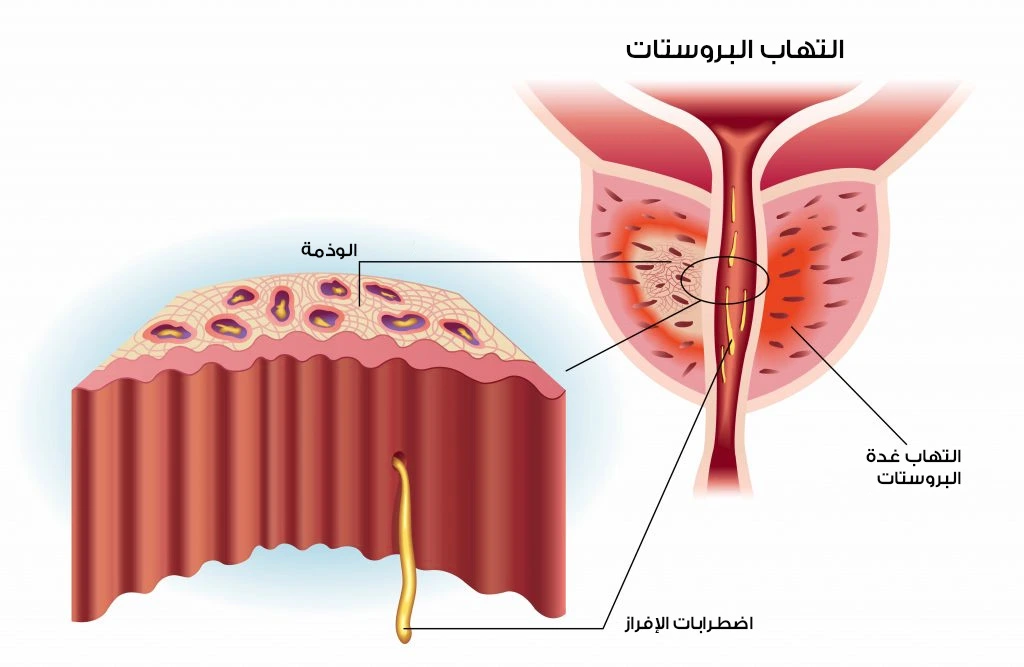
أسباب التهاب البروستاتا عند الرجال والشباب
ليس من الواضح ما الذي يسبب معظم حالات التهاب البروستاتا.
في معظم الأحيان، يسبب الالتهاب المحلي في البروستات تخريشاً في الأعصاب والعضلات في الحوض والذي يسبب الألم، والسبب الأقل شيوعاً، هو العدوى البكتيرية.
حيث قد يستغرق الأمر بعض الاختبارات لمعرفة سبب السبب بالضبط.
التهاب البروستاتا البكتيرية تنتج عن إصابة بكتيرية في البروستاتا.
حيث يمكن أن تدخل البكتيريا في البروستاتا عندما يتدفق البول المصاب الذي يحتوي على الجراثيم إلى الوراء من مجرى البول.
قد يرتبط التهاب البروستاتا الغير جرثومي بالتوتر أو التهاب الأعصاب أو التهيج بعد الاصابة بالتهاب الطرق البولية.
أو قد يحدث إذا كان جسمك مازال يتفاعل مع العدوى أو الإصابة التي حدثت في الماضي.
هذا الشكل من التهاب البروستاتا ليس لديه علامات للبكتيريا في البول أو السوائل المنوية.
آلام الحوض الأخرى قد تتشكل أيضا من:
- توتر عضلات الحوض
- حصوة البروستاتا
- تضيق الإحليل (تضييق مجرى البول)
- سرطان البروستات
- ضغط بسبب تضخم البروستاتا الحميد (BPH، النمو غير السرطاني للبروستاتا)
تشخيص التهاب البروستاتا في تركيا
كل نوع من التهاب البروستاتا يستدعي علاج مختلف.
سيرغب طبيبك في معرفة السبب وراء الأعراض الخاصة بك بالضبط. للعثور على الإجابات، سيتم استخدام أكثر من نوع من الفحص:
- قصة سريرية وفحص بدني: قد يقوم الطبيب الخاص بك بفحص المستقيم (DRE)، يتم ذلك عن طريق فحص البروستات يدوياً من المستقيم، حيث يقوم طبيبك بالضغط والشعور بالبروستاتا لمعرفة ما إذا كان حجمها طبيعي أم كبير، قاسية أو طرية. حيث يمكن التنبؤ بسرطان البروستات عن طريق هذا الفحص.
- اختبارات عامة.
- التصوير بالأمواج فوق الصوتية (الإيكو).
- اختبارات البول وسوائل البروستاتا: عندما يتم تدليك البروستاتا خلال DRE، يخرج سائل يسمى إفراز البروستاتا المعبر عنه (EPS) من القضيب،يتم فحص البول والـ EPS لرؤية إن كان هنالك عدوى بكتيرية أو التهاب.
- إذا كنت في خطر الإصابة بالسرطان، فقد يطلب الطبيب إجراء اختبار دم للتحقق من مستوى مستضد البروستاتا (PSA)، ولكن إذا كان لديك عدوى البروستاتا، فيمكن أن تكون نتيجة PSA الخاص بك مرتفعة قليلاً.
- تنظير المجرى البولي: المنظار هو تلسكوب طويل رقيق مع ضوء في النهاية.
- دراسة سرعة تدفق البول (الديناميكا البولية).
علاج التهاب البروستاتا المزمن
يعتمد علاج التهاب البروستاتا المزمنة على النوع الذي لديك.
لعلاج التهاب البروستاتية البكتيرية الحادة، ستحتاج إلى تناول المضادات الحيوية لمدة 14 يوما على الأقل، وتقريبا كل الالتهابات الحادة تعالج بهذا العلاج.
في بعض الأحيان، ستحتاج إلى البقاء على المضادات الحيوية لمدة تصل إلى أربعة أسابيع.
إذا لم يعمل مضاد حيوي واحد، سيحاول طبيبك استخدام نوع آخر.
علاج التهاب البروستاتا المزمن البكتيري في تركيا/ اسطنبول
لالتهاب البروستاتا البكتيري المزمن، ستحتاج إلى تناول المضادات الحيوية لفترة أطول، في أغلب الأحيان لمدة 4 إلى 12 أسبوعا.
حوالي ثلاثة أرباع هذه حالات التهاب البروستاتا البكتيرية المزمنة يتم علاجها بهذه الطريقة.
بالنسبة للحالات التي لا تتفاعل مع هذا العلاج، يتم استخدام المضادات الحيوية ذات الجرعة المنخفضة على المدى الطويل لتخفيف الأعراض.
ما هو أقوى مضاد حيوي لعلاج التهاب البروستاتا المزمن؟
هو المضاد الذي يتم اختياره بعد عملية زرع الجراثيم لمعرفة الجرثوم المسبب لهذا الالتهاب واستخدام الصاد المناسب له، وقد أثبتت الدراسات في الآونة الأخيرة نجاعة الصاد الحيوي الفوسفومايسين في علاج التهاب البروستات المزمن البكتيري.
علاج التهاب البروستاتا المزمن المترافق بمتلازمة الألم الحوضي CP/CPPS
نظرا لأن السبب الدقيق ل CP/CPPs غير معروف، فقد يعطي بعض الأطباء المضادات الحيوية حتى لو لم تثبت اختباراتك أن البكتيريا هي السبب.
في أوقات أخرى قد يعطي الأطباء مضادات للالتهابات أو الأدوية التي تقلل من ألم الأعصاب.
حاصرات ألفا لعلاج التهاب البروستاتا المزمن
بعض الأطباء يقومون بإعطاء أدوية تسمى حاصرات ألفا لمساعدتك في الشعور بالتحسن.
هذه الأدوية تساعد في الاسترخاء في العضلات حول البروستاتا وقاعدة المثانة.
عوامل مضادة للالتهابات لعلاج التهاب البروستاتا المزمن
قد تجعلك الأدوية المضادة للالتهابات (NSAIDs) أكثر راحة، هذه هي أدوية الألم (الأسبرين، الإيبوبروفين، إلخ) ومرخيات العضلات.
التدليك للبروستاتا لعلاج التهاب البروستات المزمن
تدليك البروستاتا يمكن أن تساعد في تخفيف الضغط في البروستاتا، يتم ذلك عن طريق إخراج السوائل من قنوات البروستاتا بينما قد يقوم العلاج الطبيعي بإرخاء العضلات القريبة.
العلاجات المنزلية والتقنيات الأخرى لتقليل الألم
قد تساعد الحمامات الساخنة، عبوات المياه الساخنة أو الكمادات الدافئة أيضا على تخفيف الألم.
تمارين الاسترخاء والعناية بالغذاء أيضا قد تخفف بعض الأعراض الخاصة بك.
قد يقترح الطبيب الخاص بك أن تتوقف عن تناول وشرب بعض الأطعمة، قد تشمل الأطعمة الحارة أو الحمضية والمشروبات التي تحتوي على الكافيين أو المشروبات الكحولية.
وقد يوصي بشرب المزيد من الماء، وتناول المزيد من الأطعمة الطازجة / غير المجهزة وكمية أقل من السكر، قد يقترح عليك أيضا أن تتوقف عن فعل الأشياء التي يمكن أن تجعل ألمك أسوأ (مثل ركوب الدراجات).
علاج التهاب البروستاتا المزمن بالأعشاب
لا يوجد دليل على أن الأعشاب والمكملات الغذائية تحسن التهاب البروستاتا.
تشمل الخيارات التي تمت تجربتها وفشلت في المساعدة في علاج التهاب البروستاتا العشب التجاري (Cernilton)، وهي مادة كيميائية موجودة في الشاي الأخضر والبصل ومخلص البلميط المنشاري.
يمكن أن تؤثر المكملات الغذائية على العلاجات الأخرى، لذلك إذا كنت ترغب في تجربة المكملات العشبية، فالرجاء إخبار طبيبك أولا.
علاج التهاب البروستاتا المزمن عبر الوخز بالإبر
بعض الرجال يستخدمون الوخز بالإبر للحد من الألم. الوخز بالإبر ينطوي على إدراج إبر رفيع جدا من خلال الجلد إلى أعماق مختلفة من الجسم طبعاً إلى الآن لا يوجد أي دليل علمي عليها.
الجراحة لعلاج التهاب البروستاتا المزمن
في حالات نادرة، قد تكون هناك حاجة إلى الجراحة على مجرى البول أو البروستاتا. يجب أن تكون هناك مشكلة دقيقة مع الجسم، مثل وجود ندبة في مجرى البول، أو استئصال البروستاتا كاملاً عبر الإحليل.
معظم حالات التهاب البروستاتية البكتيرية الحادة يتم علاجها مع الأدوية.
لسوء الحظ، فإن CP / CPPS ليس سهلاً علاجها. في معظم حالات CP / CPPS، إذا استخدمت المضادات الحيوية فقد تواجه الأدوية مشكلة في الوصول إلى البكتيريا وقتلها في العمق في البروستاتا.
أحدث الطرق لعلاج التهاب البروستاتا نهائيا في تركيا
تطورت تركيا بشكل كبير في الآونة الأخيرة، وعمدت إلى تطوير وتحديث مشافيها وتدريب كوادر طبية متخصصة في جميع المجالات من أجل تقديم أفضل خدمة طبية بأفضل الأسعار.
ومن طرق العلاج الحديثة في تركيا:
علاج التهاب البروستاتا المزمن بالموجات الدقيقة عبر الإحليل TUMT (Transurethral Microwave Therapy)
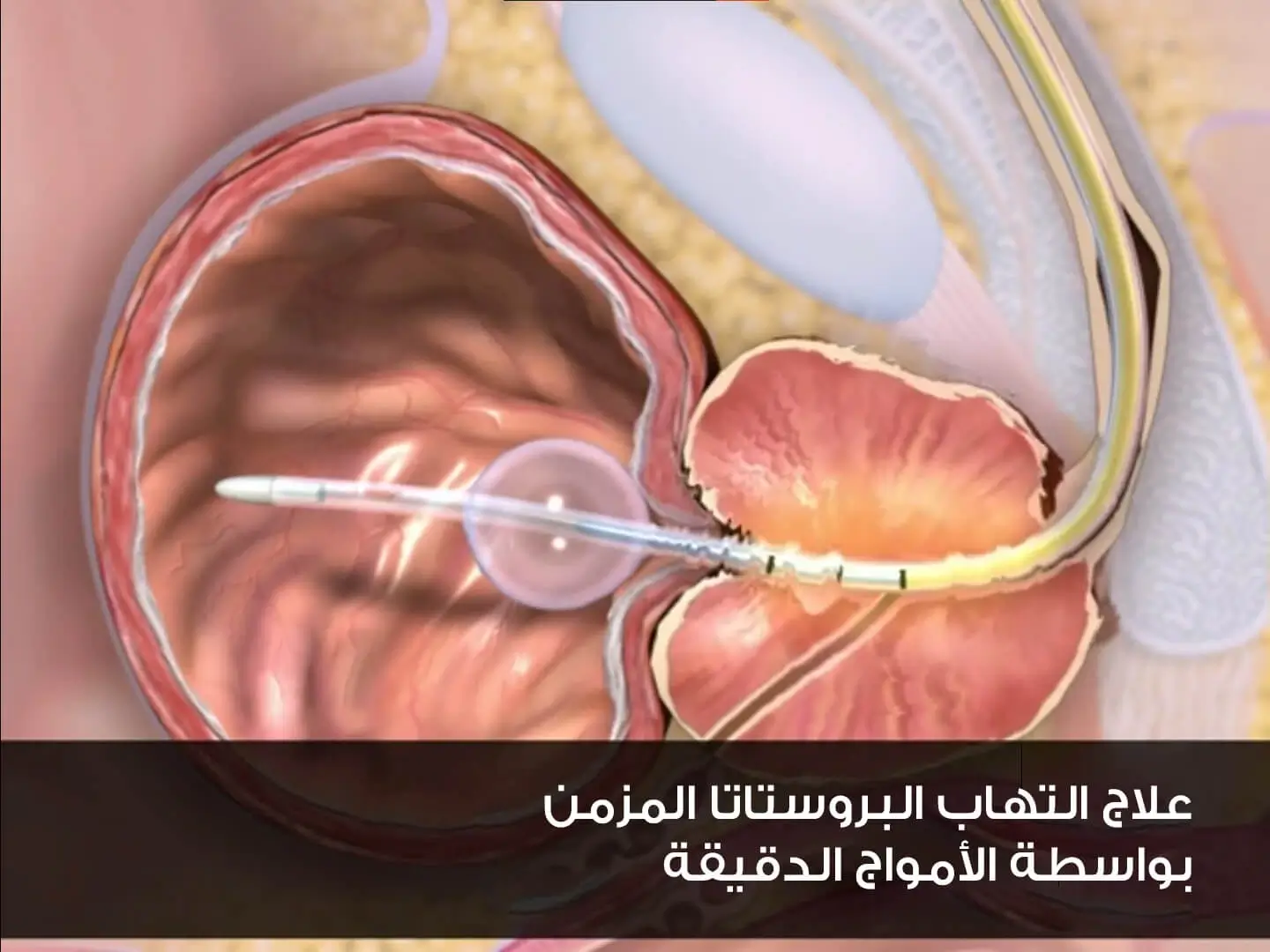
إحدى طرق العلاج الجديدة في علاج البروستاتا. علاج TUMT غير الجراحي يستخدم في المرضى الذين يعانون من تضخم البروستاتا أو التهاب البروستاتا المزمن، حيث يتم الحصول على نتائج فعالة وآمنة ودائمة دون جراحة.
العلاج بالترددات الراديوية عبر الإحليل للبروستاتا هو طريقة علاج طفيفة التوغل تستخدم طاقة الميكروويف لتصغير أجزاء أنسجة البروستاتا التي تعاني من التضخم وللقضاء على الأنسجة الملتهبة في التهاب البروستاتا المزمن.
علاج الموجات الحرارية عبر الإحليل (TUMT) هو إجراء يتم إجراؤه في العيادات الخارجية لعلاج الأعراض البولية الناتجة عن تضخم البروستاتا.
في هذا العلاج، يقوم الطبيب بإدخال القسطرة البولية التي يوجد على طرفها مولد الموجات الميكروويفية عبر فتحة البول.
يتم إرسال القسطرة عبر الإحليل، يستخدم TUMT جزءاً يحمل جرعة من طاقة الميكروويف، ويسخن ويدمر خلايا البروستاتا الزائدة.
الهدف من العلاج هو تقليل حجم البروستاتا وتحسين الأعراض. يقدم علاج الموجات الحرارية عبر الإحليل (TUMT) حلولًا فعالة وموثوقة ودائمة، كما يمكن للمريض العودة إلى المنزل في يوم علاج الموجات الحرارية عبر الإحليل.
مع هذه الطريقة في العلاج بالإمكان علاج تضخم البروستاتا أيضاً حيث إن نسبة نجاح العلاج، هي 90٪ عبر الموجات الحرارية عبر الإحليل (TUMT) بدون جراحة.
مع هذا العلاج، يمكن علاج البروستاتا التي يزيد وزنها عن 100 جرام بسهولة، أثبتت الدراسات أن العلاج ناجح حتى في البروستاتا التي تزن 150 جراما، أكبر البروستاتا التي عولجت حتى الآن هي 287 جراما.
حسب دراسة أجريت في بلجيكا فإن نسبة نجاح علاج التهاب البروستاتا المزمن هي حوالي 88% للمرضى الذين لم يتم شفاؤهم بالطرق التقليدية.
اقرأ أيضا في موقعنا عن: علاج سرطان البروستاتا بالموجات فوق الصوتية.
حقن البروستاتا لعلاج التهاب البروستاتا المزمن
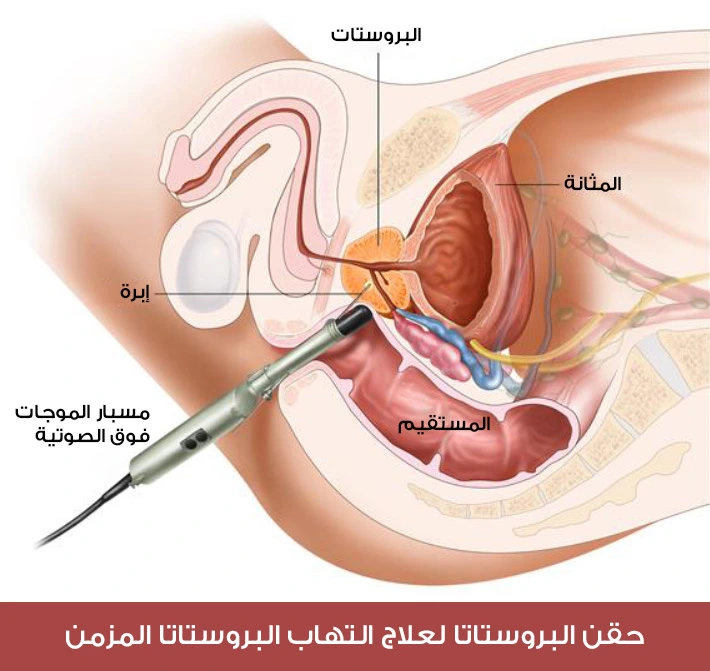
في المرضى الذين يعانون من التهاب البروستات الجرثومي المزمن وفي وجود مناطق ليفية في البروستاتا، يتم حقن مزيج من المضاد الحيوي والكورتيزون مباشرة في هذه المناطق.
حيث إن العلاجات التقليدية بالمضادات الحيوية، قد تعالج لفترة محددة ولكن هنالك احتمال في تكرار العدوى في هذه البؤر يعتبر كبيراً، المضاد الحيوي المعطى في البروستاتا أعلى بـ 2500 مرة من الأخذ من الفم أو الوريد. هذا يزيد من قوة الشفاء.
كما تطور في تركيا العديد من الأبحاث لمعرفة أسباب تضخم البروستاتا في سن مبكر، بالإضافة للعديد من العلاجات المختلفة سواء لتضخم البروستاتا الحميد أو سرطان البروستاتا بعدة مقاربات وطرق جراحية مختلفة ك:
- علاج تضخم البروستاتا بالليزر في تركيا
- علاج تضخم البروستاتا بالقسطرة
- استئصال البروستات بواسطة الروبوت
- علاج تضخم البروستات بالبخار بدون جراحة
- علاج سرطان البروستاتا بالاشعاع
- استئصال البروستاتا عبر الإحليل
شفيت من التهاب البروستات المزمن وتجربتي مع التهاب البروستاتا المزمن
يشارك هنري أستير (مريض ألم حوضي والتهاب بروستات مزمن) قصته وتجربته مع التهاب البروستات المزمن فيقول:
كنت أظن أن لدي سرطان بروستات وخاصة أن من هم بعمري معرضون بشكل كبير لهذا المرض، ولكن ظهرت النتائج سلبية وبقيت متحيرا عن سبب الألم، ووصف لي الأطباء عدة مضادات حيوية وفي الغالب لم تنفع، قرأت عدة كتب ومقالات عن حالتي ووجدت أن التأمل والتمارين الرياضية هي أفضل حل لي وأن أنظر إلى الألم بمنظور مختلف، واكتشفت أن الألم يزداد بسبب الضغط والتوتر، ويبقى التهاب البروستات المزمن دوائي أو جراحي العلاج في غالب الأحوال.
حقائق إضافية حول علاج التهاب البروستاتا المزمن
- الحصول على التشخيص المناسب هو المفتاح لرعاية التهاب البروستاتا.
- التهاب البروستاتا لا يشمل دائما البروستاتا، قد تكون المشكلة في الأنسجة القريبة.
- يبقى هنالك احتمال ولو كان صغيراً جداً مقارنةً بالعلاجات القديمة ألا يتم شفاؤك من التهاب البروستاتا، ولكن يمكن إدارة أعراضه.
- يجب اتباع العلاج حتى لو كنت تشعر بتحسن.
- المرضى الذين يعانون من التهاب البروستاتا هم في خطر أكبر للحصول على سرطان البروستاتا حسب الدراسات.
- ليس هناك سبب لوقف الجنس العادي ما لم يزعجك.
- يمكنك أن تعيش حياة طبيعية معقولة مع التهاب البروستاتا.
في النهاية نجد أن لعلاج التهاب البروستاتا المزمن عدة طرق علاجية في تركيا، وإن التهاب البروستات المزمن أصبح حالة بسيطة يمكن علاجها على عكس السابق، ويبقى الاعتماد على تعاون المريض مع الطبيب للتخلص من هذا المرض المزعج.
المصادر:
